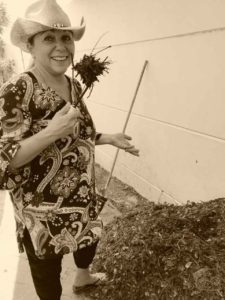Citizens worldwide now more than ever, are keen to find their own sustainable solutions and have discovered composting as a good way to do their bit for the environment, by managing kitchen and food scraps instead of just throwing it in the garbage, that goes into landfill and does a lot of harm to the planet.
We are now more aware of living consciously and seek more sustainable habits such as recycling in the home, making better choices to buy fresh produce from farmers’ markets with less packaging, and making small steps towards a zero-waste lifestyle.
Many cities have good waste management services however the ‘green waste’ or food waste collection is lagging in many parts of the world. Conscious consumers have found an easy way to manage this and have discovered composting is the way to go to reduce household waste and put it to good use.
The UAE has many globally conscious residents. Composting is really taking off with many residents doing it for the first time! You do not need to have a garden, if you live in a villa or an apartment, composting can be done easily by anyone!
If you are new to the process of composting, it may seem a bit tricky at first, however, once you get started (usually the most difficult step) most people find it an easy habit of just putting kitchen scraps into a container and separating it from their other rubbish. This is really the first step towards composting and then choosing the best method for your household.
Now, even though the basic composting process is the same everywhere around the world, climatic conditions do have an effect such as very cold winters slowdown the ‘breakdown’ and a hot climate, as in the Middle East, speeds up the process, making compost even faster.
Compost is decomposed (broken down) organic matter (kitchen scraps like vegetable peelings, garden waste like grass or leaves) in any size container from a small bucket to a large outdoor compost bin.
Anyone can, composting is easy, and every household can do it with no added costs.
There are so many reasons to make compost from your kitchen scraps with the most important one is to keep this vital resource (organic materials) out of landfill ad wasting a natural resource. When food is disposed of in a landfill it rots and becomes methane which is a potent greenhouse gas with a greater impact on global warming. If we can each minimize our impact by composting our food waste, we can all make a difference, every day.
This really depends on your living situation, if you are in an apartment or a villa, the methods can range from collecting your kitchen scraps to either making compost in a container on a balcony or in the garden but if you’re wanting an easier way to manage your food waste, Bokashi* could suit you more. You can even collect your waste and ‘gift’ it someone else who has a compost system or even use the ‘dig n dump’ method by digging a hole in the ground and putting the bucket load of food waste right in, covering and forgetting about it.
Here is another article by Sustainability Tribe founder, Amruta, sharing her home composting method using a Gobble composter.
Bokashi* is a method of collecting food waste in a ‘pickling’ method by using a sealed bucket with an airtight lid, this is a great way to compress a lot of food waste and then use it in an outdoor compost system to boost the breakdown activity or even just ‘dig n dump’ into the soil acting as a soil improver.
To read more in detail about different methods of compost here and another resource on Garden that matters.
Once you have decided which method suits you best, start collecting your kitchen scraps; an easy way is to have a container on the benchtop where you will see it, adding kitchen scraps to it daily and when full, then add it to your in/outdoor composter.
Let us ‘Keep It Simple Sally” – K.I.S.S
For all composting methods, it is basically the same ‘recipe’, compost requires mixing GREEN with BROWN stuff, layered like lasagna, adding a little water will make compost!
GREEN stuff is food waste like vegetable scraps, tea, green leaves/grass – GREEN = NITROGEN
BROWN stuff is usually brown in color like dried leaves or grass, cardboard/paper – BROWN = CARBON
Read more on composting here.
For whatever reason you choose to compost, whether it is to use compost to feed the soil in your garden or you just want to live more sustainably, there are several ways to use it.
Compost is used for making soils more fertile, great to use as a top dressing for pot plants with the added benefits of helping retain moisture in gardens or pots by increasing the water holding capacity, meaning plants need less watering.
You can also donate it to a community composting program where you live. Around the world, in many large cities, there is a groundswell of community composting programs to support many households by taking the food waste and using it to make vast amounts of compost for community gardens.
There are some listings in the UAE to join this worthy composting program, please check out MakeSoil.org to find a soil maker near you and if you do not find a host, you can always list yourself as a ‘supporter’ and grow your own community composting group, wherever you live.
Here are some common problems faced by people who are composting in UAE along with the best solutions suggested.
Extra care is needed to keep moisture levels correct for optimum ‘breakdown’ conditions; this can be done by adding either rinsed rice water, blending up citrus peels with a little water, or making a very diluted coffee or tea blend to add.
It is a good idea to keep your outdoor compost in the shade either under a tree or awning or put a lid on it.
The compost should have an ‘earthy’ smell that is pleasant. If the compost smells bad it usually is a sign that it is too wet or has too much ‘green’ matter, so we suggest adding extra ‘brown’ like shredded paper or dried leaves. It’s normal to smell a bit also just at the beginning when it is getting hot and decomposing.
As the compost is breaking down it does attract small insects, just like overripe fruit will in a bowl. The insects are ‘beneficial’ bugs and good for the process and usually go away when the compost is ready.
The best thing to do with the ‘ready’ bokashi is either add it to an outdoor compost heap, dig it into a hole in the ground (and cover with soil/sand) or ‘gift’ it to a friend or community garden. The juice can be diluted 1:10 ratio as a plant tonic, it can be poured into an outdoor compost heap, or use as a ‘drain cleaner’.
You can use recycled shredded paper or cardboard, collect leaves from your neighborhood.

Wendy strongly believes that the, answer to many of the global issues today is right under our feet, with soil health playing an important role in improving our climate impact.
Join Wendy’s Facebook group, COMPOSTMEUAE, that has more than one thousand happy composters. In one year, this group will convert 240,000kg of food waste into compost in the United Arab Emirates – (Based on a conservative estimate of one (1) house-hold daily food waste amounting to approximately 20kg per month.)
Sustainability Tribe has been bringing you specially curated articles from ‘Sustainability Industry Experts’ since 2009. This is one such expert article and not a sponsored post. The views expressed in this article are the author’s own.

Amruta Kshemkalyani, an expert sustainability professional turned social entrepreneur, is the founder of the Sustainability Tribe, AK Sustainability
Read More >>
Copyright 2025 © Sustainability Tribe, Registered under 'Sustainability Tribe Marketing Management' in the U.A.E., Design by LBM INFOTECH